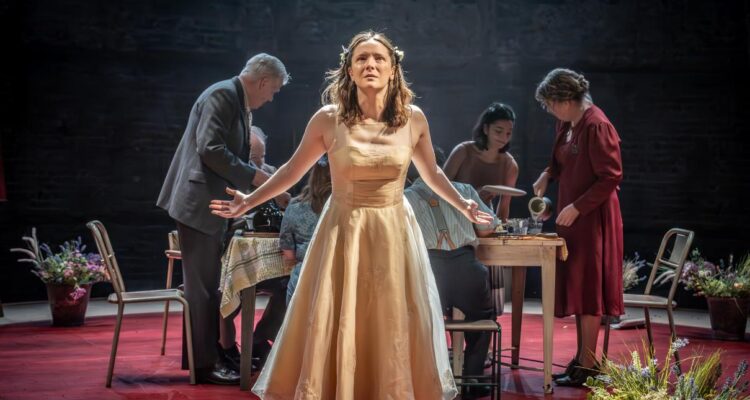What happens when you outgrow your environment? This is the question posed by Roots, Arnold Wesker’s searing play of self-discovery. Written in 1958, it is receiving a timely revival as part of the Almeida’s ‘Young and Angry’ season, a piece of theatrical provocation that sets out to breathe life (and rage) into classic pieces of 1950s kitchen-sink drama through the bright, fiery eyes of young directors, Diyan Zora and Atri Banerjee.
Set in darkest Norfolk, where time is measured in passing buses and village gossip sustains the dragging days, Roots shows what happens when Beatie Bryant (Morfydd Clark) returns home to her provincial family after time away in London. Invigorated by urban intellectualism, it’s not long before Beatie tears through the countryside rhythms of life represented in the gentle revolutions of the circular stage. Wesker’s heroine spouts socialist ideology and proudly beams about her love for abstract art. Unsurprisingly, she finds herself at odds with her rustic family, whom she now takes it upon herself to re-educate, a mission beset with frustration and self-loathing. This newly acquired education is all thanks to her boyfriend Ronnie, a pedagogue in the mould of Shaw’s Professor Higgins but now notably as absent as Godot. He’s a no-show at his own welcome party in the play’s final act.
Morfydd Clark is incandescent as Beatie. At one moment she’s impassioned; now she’s prickly, full of youthful optimism, and by the end, painfully clear-sighted. In the play’s infamous final speech—an attack on the classism inherent in the production of culture—Clark unleashes a torrent of cathartic rage set to classical music. Zora has her positioned at the front of the stage in a tableau that is reminiscent of Eugene Delacroix’s Liberty Leading the People (1830), evoking all its revolutionary fervour. It’s nothing short of electric.
The cast, more generally, have a compelling chemistry, a point Zora underlines by deciding to make them serve as stagehands, providing a sense of the love and labour that underpins this working-class community. Particularly brilliant were Jimmy Beales (Michael Abubakar) and Jenny Beales (Eliot Salt), who brought warmth and heart, lifting the production into laughter in humorous lines about local drunkards or gut ache. Similarly, scenes between Beatie and Mrs Bryant (Sophie Stanton) made for compulsive watching, as filial frustration and shame evoked maternal guilt, then anger, swaying audience sympathies.
The set designed by Naomi Dawson is suitably spartan, reflecting the difficult working lives of the Bryants, who are precariously employed and even fear the damage that cooking a sponge cake could do to the electricity bill. This harsh reality is also reflected in Tomás Palmer’s costumes. Muted and sober garbs set the tone at the start of the play, but, in the final act, the whole family undergoes a Cinderella-like transformation as they scrub up to impress Ronnie.
Throughout Diyan Zora shows an incredible command over Wesker’s material. The production evinces a commendable understanding of the way that the Norfolk dialect holds so much of the power of Roots’ world, a point that Wesker stresses in the playtext and which this ensemble cast perfected. What could have been done without, however, was the glaring spotlight on Beatie during key speeches, which felt unnecessarily heavy-handed.
As a coming-of-age story, Roots still has appeal. For a young generation fleeing en-masse back to their parental abodes due to sky-high rents, critical eyes will be cast and familial discord is inevitable. But as the red linoleum stage revolves like a huge red button in the play’s final moments, the radical proposition seems to be, so, who’s ready to push?
Drama
By Arnold Wesker ( 1932 – 2016)
Director: Diyan Zora
Cast includes: Morfydd Clark; Sophie Stanton; Eliot Salt; Michael Abubakar; Deka Walmsley; Tony Turner; Billy Howle; Ellora Torchia; Iwan Davies.
Until: Saturday 23rd November 2024
Running Time: 1 hour and 45 minutes
Photo credits: Marc Brenner

